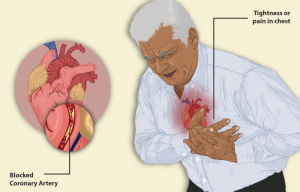A heart attack is one of the most serious problems that can affect a person’s heart. It is the leading cause of death in Brazil and one of the main causes worldwide. It can be even more serious if no one recognizes what is happening when the symptoms occur. For this reason, today we are going to talk about heart attack symptoms and how understanding this issue can be crucial. But first, it is important to understand exactly what a heart attack is and why it happens. Want to know more about the subject? Check out everything in today’s article!
What is a Heart Attack?
A heart attack is basically the death of part of the heart—specifically the myocardium—caused by difficulty pumping blood. This difficulty, in turn, can occur for several reasons, from blockages of veins and arteries to excessive fatigue of the heart muscle. It is a very serious problem and can leave severe consequences and, for that reason, it is necessary to be alert to the signs and to the different types of heart attacks that exist.
Types of Heart Attack
Although all heart attacks have roughly the same consequences, there are some types that have important differences between them. They are classified from type 1 to type 5. Let’s talk a bit more about each one below.
Type 1 Heart Attack
This is a spontaneous type of heart attack and usually occurs due to pre-existing cardiovascular diseases.
Type 2 Heart Attack
This occurs when there is a lack of oxygen in the blood, forcing the heart to work excessively and causing the death of part of it. It is common in people with anemia, high blood pressure, or arrhythmias.
Type 3 Heart Attack
This type is a silent heart attack, which means it happens unexpectedly and shows few signs. It usually occurs due to a blockage in the coronary artery that was not previously detected.
Type 4 Heart Attack
This type of heart attack requires angioplasty, that is, revascularization of the heart.
Type 5 Heart Attack
This is also a heart attack that requires myocardial revascularization surgery. 
What are the Symptoms of a Heart Attack?
Acute myocardial infarction is not always silent and, quite often, may show signs that it will happen. Some of the main symptoms of a heart attack are:
- Dizziness
- Pain in the abdominal region
- Swollen feet
- Heartburn
- Fatigue and weakness
- Pain in the chest area
- Cold sweat
- Fainting
It is worth noting that, in women, some different symptoms may appear, such as:
- Arrhythmia
- Chest discomfort
- Nausea
Often just one of these symptoms does not mean anything and at other times they can go unnoticed. But when a person feels the combination of two or more of them, it is important to be on alert, especially if they are part of a risk group, such as heart patients, smokers, or obese individuals, for example. Knowing the symptoms of a heart attack and, most importantly, knowing how to handle them if they appear, is essential to saving lives.
Causes of Heart Attack
It is not possible to determine just one cause for a heart attack, since it can arise in several ways. However, it is important to show which are the main causes so you have a better idea of whether you are part of a risk group or not. The main causes of heart attack are:
- Smoking
- Excessive use of alcohol and drugs
- High blood pressure
- Obesity
- Atherosclerosis
- Diabetes
Acute myocardial infarction is directly related to a person’s health conditions. For this reason, maintaining healthy habits is a great way to prevent this type of problem from happening to you.
The importance of acting quickly
Acting quickly when you have heart attack symptoms can be the difference between surviving this problem or not. As you may have noticed, a heart attack gives various signs before it really happens. And that is the best thing we can know about it. When you act quickly and seek out a doctor at the first symptoms, the heart attack can become less serious. When you are in a hospital, assisted by doctors and already prepared in case something occurs, it is much less likely that the consequences of a heart attack will be most severe. That’s why understanding what the symptoms of a heart attack are and knowing how to identify them is so important, especially if you are in a risk group. As we have said, this can be the difference between life and death. Heart attack is the leading cause of death in Brazil, but fortunately there are many things you can do to prevent this problem from happening to you. And even if there is a risk, understanding what the symptoms of a heart attack are will certainly help you identify these signs more quickly and act responsibly to prevent something bad from happening. Taking care of your own body is always very important. Don’t neglect this and don’t think that it is too late. Having a good life is also having good health.











